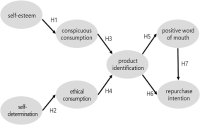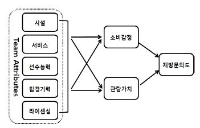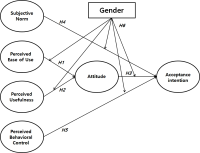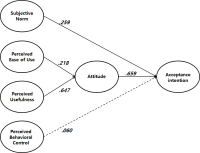
Purpose The purpose of this study was to analyze the relationships among sport-products self-congruence, product love, product trust, and purchase behavior of sports-for-all club members through structural equation model analysis. Methods A survey was conducted targetting 227, men & women in their twenties who are members of MTB, Tennis, Badminton, Golf in at the 8 in Seoul metropolitan area. For sampling method, convenience sampling method was used, while the questionnaire was self-administered. In an effort to verify the proposed structural model, this study used IBM SPSSWIN Ver. 21.0 and AMOS 18.0. Results First, actual self-congruence has positive influence on the product love. Second, ideal self-congruence didn't have positive influence on the product love. Third, social self-congruence has positive influence on the product love. Fourth, product love has positive influence on the product trust. Fifth, product trust has positive influence on the positive word-of-mouth. Sixth, product trust has positive influence on the repurchase intention. Seventh, product trust has positive influence on the attitudinal loyalty.



Purpose The purpose of this study was to empirically analyze the relationship between a sports-for-all club members self-esteem and self-determination, conspicuous consumption, ethical consumption, product identification, positive word of mouth & repurchase intention through structural equation model analysis. Methods For this purpose, this study set 279 members at the nine sports-for-all club located in national capital region as the research subjects. In an effort to verify the proposed structural model, this study used SPSSWIN Ver. 23.0 and AMOS 18.0. Results First, self-esteem had a positive effect on conspicuous consumption. Second, self-determination had a positive effect on ethical consumption. Third, conspicuous consumption had a positive effect on product identification. Fourth, ethical consumption had a positive effect on product identification. Fifth, product identification had a positive effect on positive word of mouth. Sixth, product identification didn’t had a positive effect on repurchase intention. Seventh, positive word of mouth had a positive effect on repurchase intention.


The purpose of this study was to provide managers and owners of Korea professional baseball teams with the necessary information for improving managerial performance by fan acquisition and retention. This paper chose LG, Nexen, and SK fans over the age of 17 as population of this study who visited at least twice home games held in the Jamsil, Mokdong, and Munhak baseball stadium. For the analysis of data, 413 questionnaires were used using SPSS 15.0 Windows and Amos 7.0. To examine respondents demographics traits, frequency analysis was processed and reliability analysis, confirmatory factor analysis and correlation analysis for relationship among the variables were conducted. Also, convergent validity analysis and discriminant validity analysis were made. Finally, path analysis was made for the verification of model suitability and of research hypotheses through structure equation modeling. The research results are as per the below. First, team attributes like physical facilities, team performance and licensing had significantly positive influence on consumption emotion. Second, team attributes like service and team performance significantly positive impact on viewing value. Third, consumption emotion had significantly positive impact on revisit intention. Fourth, viewing value had significantly positive impact on revisit intention.



Purpose The current study was aimed to examine acceptance intention of sports wearable smart device using the Technology Acceptance Model and Theory of Planned Behavior. Methods Data were drawn from 357 consumers who had experience purchasing sports products. Data were analyzed through frequency analysis, reliability analysis, confirmatory factor analysis, correlation analysis, and structural equation modeling using SPSS 20.0 and AMOS 20.0 program. Results First, perceived ease of use had a positive effect on attitude. Second, perceived usefulness had a positive effect on attitude. Third, attitude had a positive effect on acceptance intention. Fourth, subjective norm had a positive effect on acceptance intention. Fifth, perceived behavioral control did not affect acceptance intention. Sixth, differences of path coefficients between attitude and acceptance intention, subjective norm and acceptance intention were significant according to gender. Conclusion The significance of this research is to provide the basis of positioning strategy for domestic companies of sports wearable smart device.




Purpose The purpose of this study was to examine the relationships among sponsorship attributes, sponsorship benefits, recognition of sponsorship value, sponsorship attitude, and sponsorship certainty through structural equation model. Methods Respondents were university students living in Seoul, Kyoungki-do, and choongchung-do. The present study was designed to identify the effect of title sport sponsorship by utilizing NH V-LEAGUE title sponsorship. By using convenience sampling method, total 400 questionnaires were distributed and gathered from samples, and among them 369 valid samples were used for further analyses. The data were recorded and analyzed using the IBM SPSSWIN Ver. 21.0 and AMOS 18.0. 18.0. Results First, sponsorship attributes had a positive influence on sponsorship benefits. Second, sponsorship benefits had a positive influence on sponsorship value recognition. Third, sponsorship attributes had no positive influence on sponsorship attitude. Fourth, sponsorship benefits had a positive influence on sponsorship attitude. Fifth, sponsorship value recognition had a positive influence on sponsorship attitude. Sixth, sponsorship attitude had a positive influence on sponsorship attitude certainty. Seventh, sponsorship certainty had a positive influence on sponsorship effects (image improvement, favorability, purchase intention).
